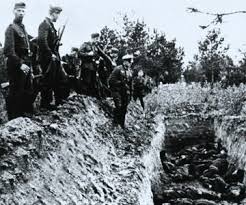They were placing those that had been criminalized by the regime in makeshift camps - old barracks, halls, etc.
It took a few months before a new administration was put in place to oversee 'permanent' camps.
Dachau opened a few months after the Nazis took power. It began by taking in dissidents.

Over time, more camps opened across Germany - Sachsenhausen, near Berlin, among others.

Many found themselves interred at Berlin-Marzahn camp, a boggy, horrid spot. They were made to complete forced labour on local projects.

That took time.
First Germany's Jews were made uncomfortable, then they were legislated against, then deported - when it was possible - to the Polish border.

Inmates from the camps were working in factories, before being taken back to their barracks every night, marched back through towns.
Nobody blinked.

The army and SS went in to Poland with lists of those marked for incarceration and execution - these had been planned well in advance.

Jews in towns and cities were herded into ghettos. Some were even filmed as part of propaganda efforts.


That came after years of propaganda that put a price on a human life, about how many Germans could be helped with the money spent on the mentally ill or disabled.
Starting in 1940, Aktion T4 killed around 250,000.


Sure, the Wansee Conference formulated the 'Final Solution', but mass killings had happened for years, the infrastructure was there.
It took surprisingly little to implement the death camps.

By the time this all began to take place, it was simply too late to protest.
The guards who beat and kicked and shot were men who sang songs to their children, liked a drink, loved their pets.
They clocked off at the end of the day.


They'd simply grown up against a background of rising hatred. They were told they were the victims, that rheir culture was being overrun.
They believed a guy when he said he'd Make Germany Great Again.

It stands out because there was no revolution, no sudden defining moment.
Slowly, but surely, men found themselves monsters. FIN.














